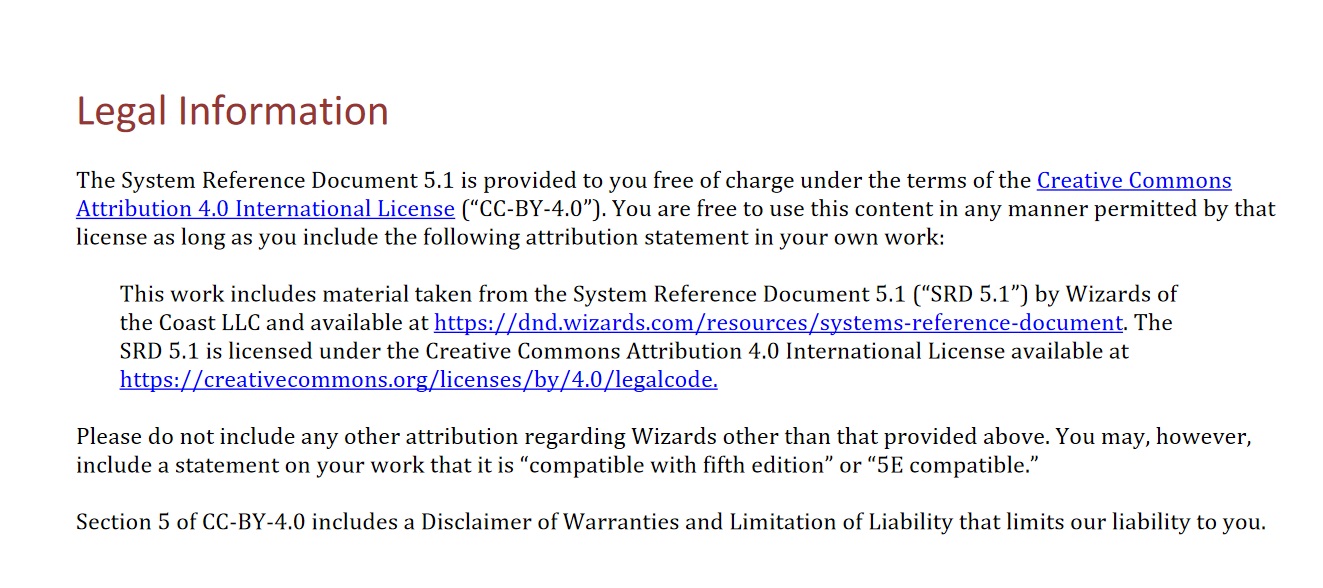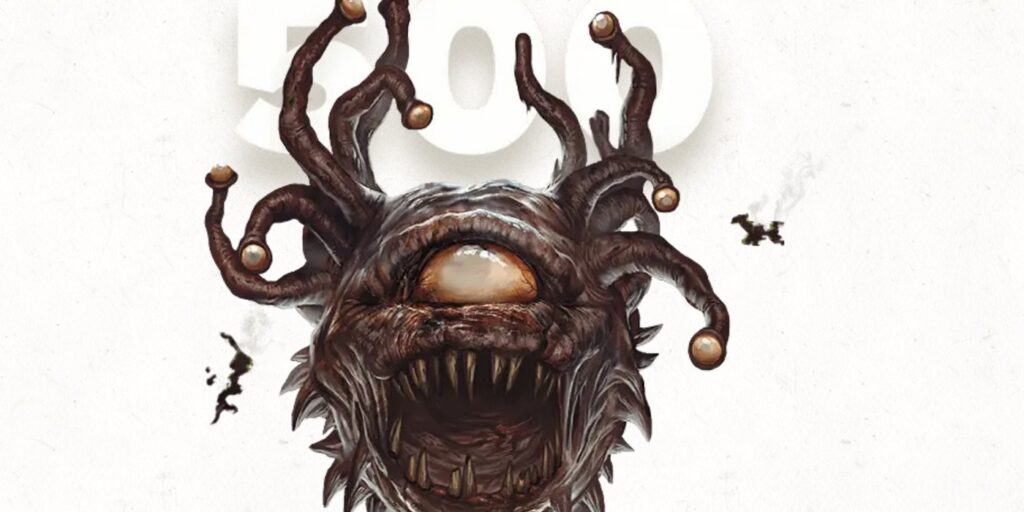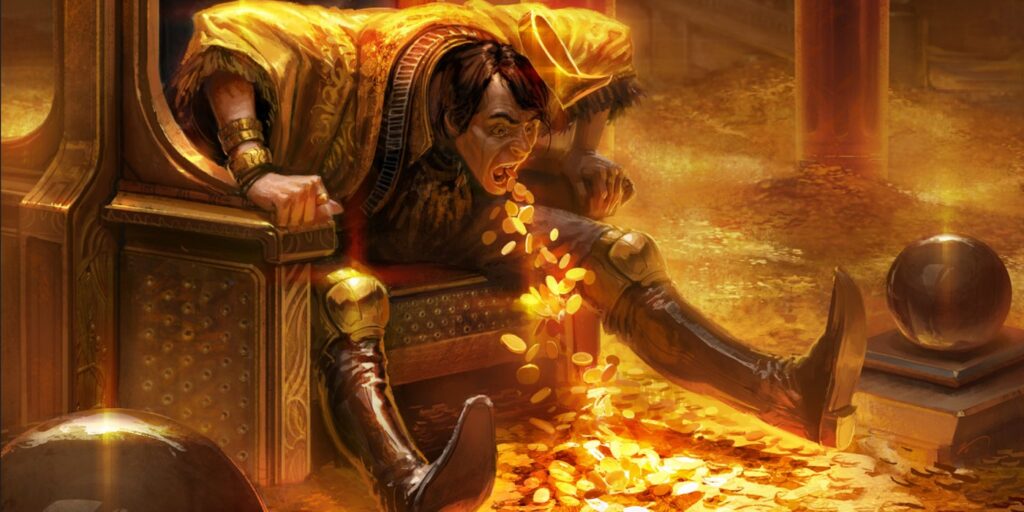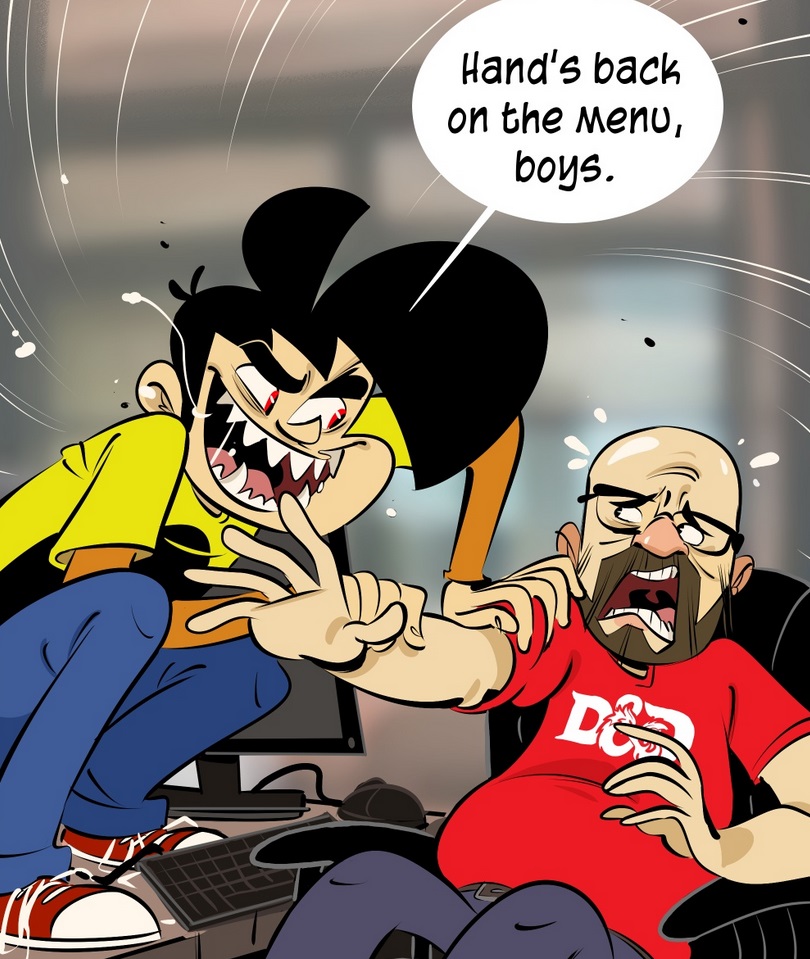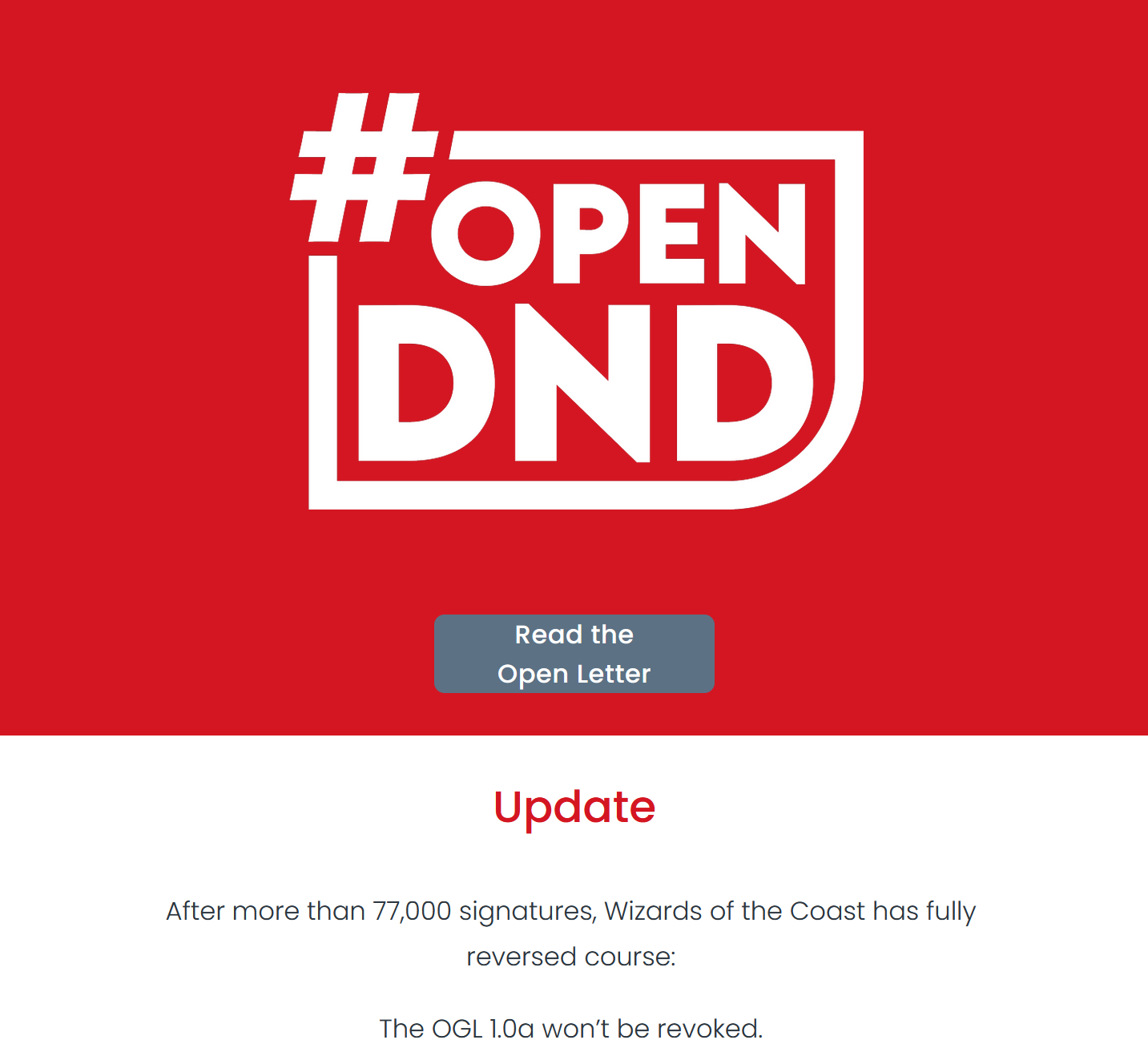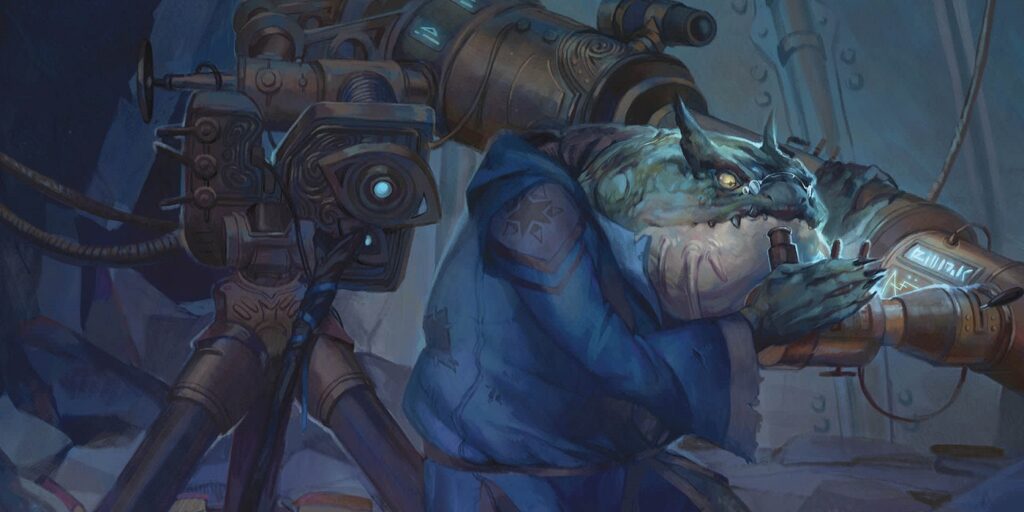Why Nobody Was Happy With WotC’s OGL 1.2
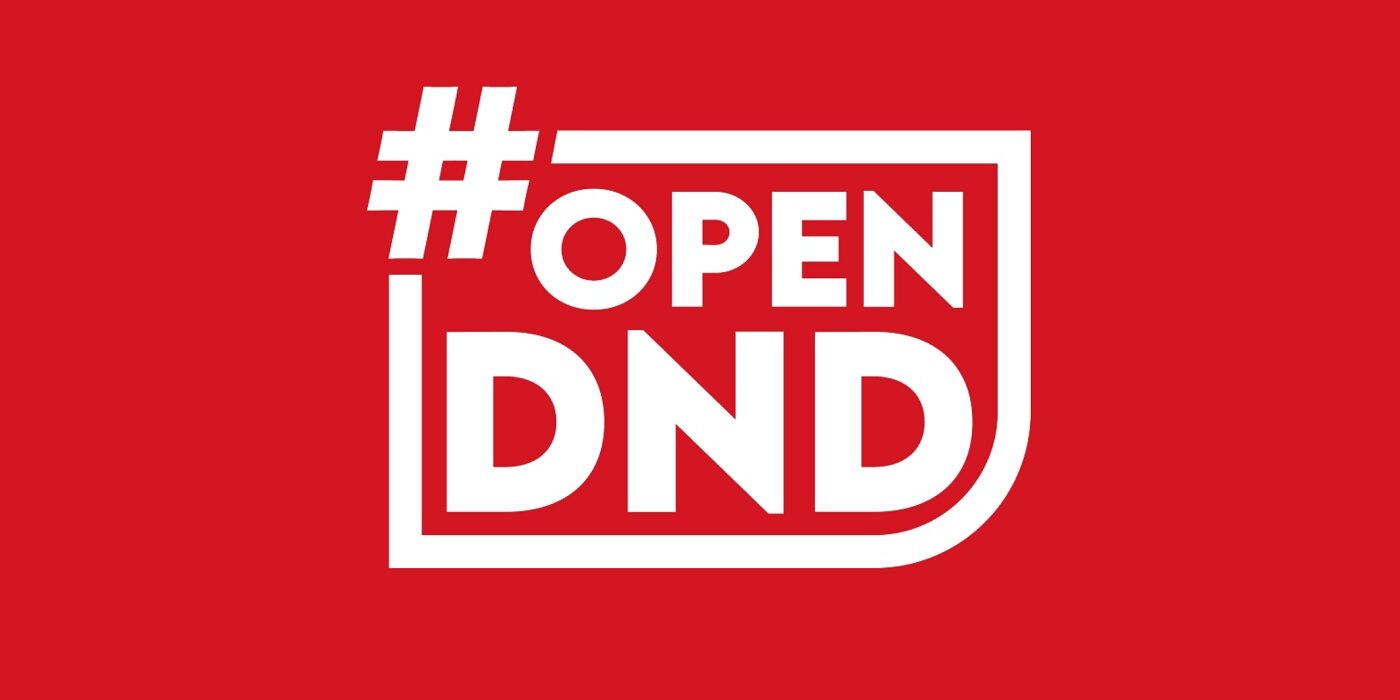
Wizards of the Coast posted their survey numbers along with their capitulation. Why, exactly, did 90% of people disapprove of the OGL 1.2?
Last Friday, Wizards of the Coast facing enormous pressure from the community, reversed course on their Open Gaming License plans. Where before, they had planned to deauthorize the OGL 1.0a in the name of “protecting D&D from hateful content and NFTs” they now, have decided to leave it as is, untouched.
Putting the SRD 5.1 under Creative Commons makes the rules much more open to folks to use safely, while also leaving in place the restrictions of the OGL 1.0a for those publishing under that license.
But along with all of these announcements, D&D Executive Producer Kyle Brink produced the startling survey results from more than 15,000 people answering the D&D Beyond “OGL Playtest Survey.”
The feedback was overwhelmingly negative. And not just by WotC’s standards, but even taking into account fun statistics like the Lizardman Constant, the vast majority of people were dissatisfied with the planned changes. Here’s a look at the numbers again:
- 88% do not want to publish TTRPG content under OGL 1.2.
- 90% would have to change some aspect of their business to accommodate OGL 1.2.
- 89% are dissatisfied with deauthorizing OGL 1.0a.
- 86% are dissatisfied with the draft VTT policy.
- 62% are satisfied with including Systems Reference Document (SRD) content in Creative Commons, and the majority of those who were dissatisfied asked for more SRD content in Creative Commons.
It’s not surprising that almost 90% of respondents were dissatisfied with deauthorizing the OGL 1.0a (a fact that comes entirely from feedback comment sections, as there was no question relating to the deauthorization in the actual survey, now closed). That number likely would have grown as more people responded to the survey.
But the other numbers tell an interesting story too. Most people would not want to use the OGL 1.2 and would have to change their business in some way in order to use it.
Why Nobody Liked the OGL 1.2
Why would this be necessary? The answer goes beyond just anger with WotC. In the OGL 1.2 were some rather shakily constructed clauses that put the community on edge. On the further edge, given the overall tenor of the last few weeks.
To get answers about the whole situation, we spoke with some of tabletop’s leading lawyers, LegalKimchi and Noah Downs. LegalKimchi’s YouTube videos cover all sorts of gaming topics, from representation and mental health to meta-gaming, to how to start your campaign, and how to do magic weapons right. Outside of YouTube, he’s a contract lawyer.
Meanwhile, Noah Downs, better known online as MyLawyerFriend, runs the Forgotten Paths live-play podcast, a D&D adventure where all the characters start with amnesia and figure out what’s going on through play. Outside of that, Downs is an entertainment and IP lawyer, specifically tackling the tabletop RPG space and video games.
But! Even though we were speaking to folks whose profession is dealing with contracts and IP cases, none of this is actual legal advice.
Just a sort of deeper perspective than usual. Keep all that in mind as you read further.
“When the Best Intentions Meet Late-Stage Capitalism.”
One of the biggest problems in the OGL 1.2 and in the OGL 1.1 before it, comes down to the fact that when it comes to contracts (which is ultimately what a licensing agreement is), words have specific meanings.
As LegalKimchi told us:
“Words have meaning, contract-wise. That’s why the first page of the OGL is full of definitions. Especially since laws and interpretations change. Dozens of cases are going through all the time—in courts across many states on many different levels.
In fact, one of the things the OGL 1.2 did great was establish the ‘governing laws’, telling us what laws the OGL would have operated under.”
Downs echoed this point, stating that one of the reasons the OGL 1.0a was in debate as to whether or not it could be deauthorized was because there was nothing specifying how the OGL 1.0a could be terminated or revoked.
Though, as he pointed out:
“Most licenses that are silent on irrevocability (meaning don’t specify how they can be revoked) are concluded to be revocable at will).”
A document like the OGL 1.0a is what you get when, as Downs stated “the best intentions meet late-stage capitalism.” Ryan Dancey and Brian Lewis, the co-creators of the OGL 1.0a might have had the best intentions, but under the pressure of capitalism, the best intentions often get in the way of the best profits.
And in fact, from the perspective of late-stage capitalism, the OGL 1.0a is extremely generous. Compare the OGL 1.1, draconian as it was, to a company like Disney’s perspective, and the license is practically generous. But even that doesn’t take into consideration the underlying structure of the TTRPG industry.
From inside it, there are different considerations entirely. Indlucing the twenty-year history built off of the OGL.
Breaching Trust
As LegalKimchi pointed out, Hasbro is in the business of growing IPs. They’re used to licenses that work for making movies about Transformers and Battleships. But that’s outside the TTRPG industry. Inside, it’s another beast.
One that has been through a rocky history. For as small an industry as the TTRPG industry is, it’s seen an awful lot of legal drama. You don’t have to look far to learn about the many legal battles that stymied creation and innovation. TSR used to be known as They Sue Regularly. The company had a reputation for being “litigiously belligerent.”
The OGL 1.0a was a promise to many that WotC could be trusted to do what was best for D&D. In a now-removed FAQ about the OGL 1.0, WotC called out what might happen if it ever decided to change the license:
This is why, as Downs puts it, the OGL 1.1 felt “more like a rug pull than a reveal”:
“It was two decades of building the community, only to change the foundation right at the end. And you cannot continue to build your house atop a shifting foundation.”
This feeling of broken trust came on suddenly with the leak of the OGL 1.1. It sent shockwaves through the community. It impacted everyone from 3rd party publishers to video creators, to players wondering where they would turn next.
And WotC made it worse by both staying silent, and referring to the OGL 1.1 as “a draft.” As many people pointed out at the time, this was sent with contracts for signatures. With the promise of “sweetheart deals” for better royalties to select people who would have signed on early. It was a breach of the community’s trust.
And that trust once breached at the community level is extremely difficult to earn back.
Untrustworthy Arbiters
Especially since Wizards of the Coast was, with the wording of their now-scrapped licenses, asking the community to trust them to be the sole judges of what was best for D&D.
This is why so many took issue with the so-called Morality Clause included in the OGL 1.2. It’s not that it’s a bad idea to say “you can’t publish hateful content.” Downs told us:
“The community likes the idea—no one wants their work associated with hate speech or bad actors. But the problem is that you give up your right to challenge someone and claim that your work is not based in actual hateful or harmful conduct.”
Especially when the clause was so vague. Downs pointed to Chaosium’s licensing policies, which include a morality clause that has been accepted by the community. But one of the reasons for this is the very clear definition of what “objectionable content is”:
You agree to not use this permission for material that depicts:
-
- excessive graphic violence or gore;
- sexual abuse, pornography, gratuitous nudity of human or humanoid forms, genitalia, or sexual activity;
- existing real-world minorities, nationalities, social castes, religious groups or practices, political preferences, gender identities, sexual orientation, or people with disabilities, as a group inferior to any other group or in a way that promotes disrespect for those groups or practices, or that endorses those groups or practices over another.
LegalKimchi added:
“It’s a lot of work to claw back the trust. Especially when, if you look for anyone publishing ‘objectionable content’ you don’t have to look far to see Wizards of the Coast reprinting Spelljammer because of the Hadozee.”
Even the best intentions here could be warped — suppose a creator makes a supplement benefiting trans children, something we agree is objectively good and then WotC somehow gets sold to JK Rowling, known TERF. That morality clause, all of a sudden becomes weaponized against the content it was meant to protect.
A Community Moving Towards Healing
But that all changed on January 27th, when Wizards of the Coast not only promised to leave the OGL 1.0a as it was, untouched but also released the entirety of the 5.1 SRD into Creative Commons. A move that, as Downs says, “actually leaves us with more rights than we had at the start of this whole fiasco.”
For one, Creative Commons is irrevocable, in the true sense of the word irrevocable. And for two, this gives the community back its choice. One D&D may use its own license. But, as Downs puts it, “by that point, they’re giving us something instead of just taking it.” You can choose whether or not you want to stay with 5E for playing or publishing.
The best possible outcome from all of this is WotC realizing that their success comes from working with the community, rather than handing down edicts from upon high:
“The employees of Wizards of the Coast that advocated for the community are the unsung heroes of all of this.”
Without the leaked OGL 1.1, we would be in a different place today with tabletop.
And so the OGL saga concludes, but gaming, the Open License movement is just beginning.

